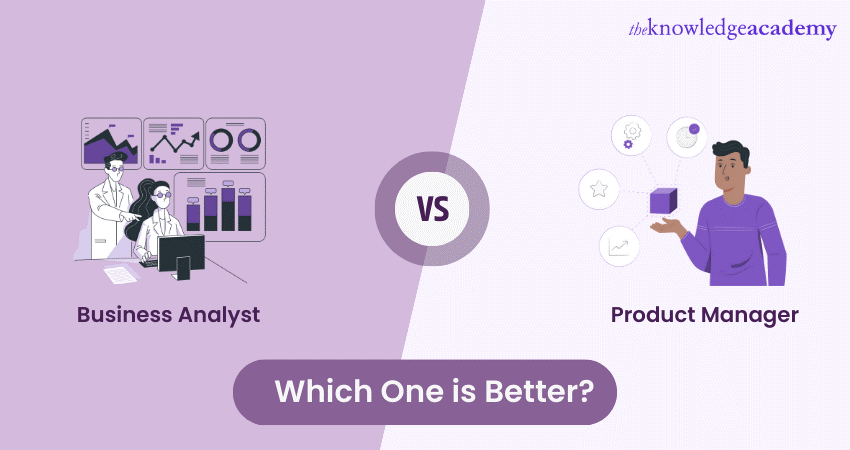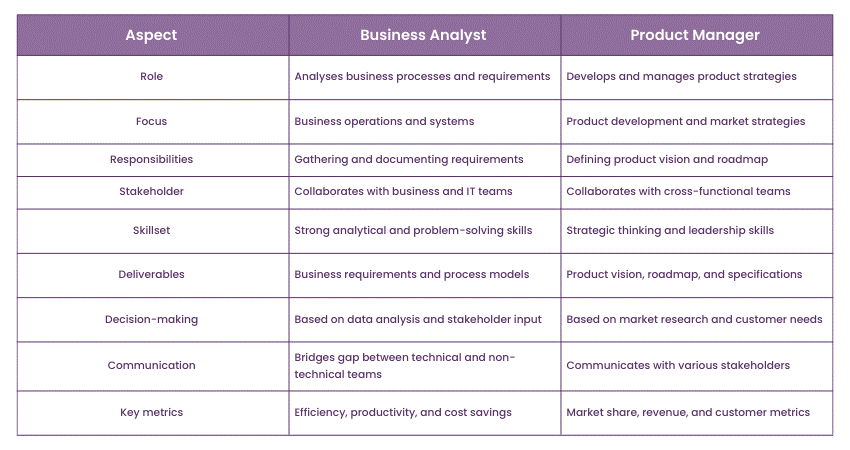We may not have the course you’re looking for. If you enquire or give us a call on + 1-866 272 8822 and speak to our training experts, we may still be able to help with your training requirements.
Training Outcomes Within Your Budget!
We ensure quality, budget-alignment, and timely delivery by our expert instructors.

Roles such as Business Analysts and Product Managers are created whenever a business decides to develop complicated products over an extensive period. Though the two roles - Business Analysts vs Product Managers appear to collaborate very closely on projects, they have distinct responsibilities that enable people to differentiate between them. Because of their close association, people are often left perplexed as to why there is a difference between the two and what it is. This is where this blog comes in, as it will give you a detailed comparative view of Business Analyst vs Product Manager.
According to Glassdoor, a Business Analyst earns £48,806 annually, while a Product Manager earns £63,607 in the United Kingdom. However, before you decide to pursue any of the two roles in your career, you must know the skills required and responsibilities of both roles and what role suits you better. In this blog, we give a detailed comparison of Business Analysts vs Product Managers.
Table of Contents
1) Who is a Business Analyst?
2) Who is a Product Manager?
3) Differences between Business Analysts and Product Managers
4) Business Analyst vs Product Manager: Which One to Choose?
5) Conclusion
Who is a Business Analyst?
A Business Analyst can be defined as a professional in charge of synchronising the client's needs with the product's result. They ensure that the team produces the appropriate goods according to the client's order.
A Business Analyst's job is to bridge the gap between the organisation's technical and business teams by searching for faults and vulnerabilities and analysing their effects. They will most likely associate with the team's technical side, as they are likely to possess extensive technical analysis and design training. Though this might make them less business-savvy than a Product Manager, they are still considered more technologically proficient.
Business Analysts are
1) Investigators
2) Researchers
3) Mediators who work closely with product owners to establish the project's scope and visualise the necessary resources and standards. A Business Analyst is typically recruited to ensure that the final product meets genuine business demands and is optimally integrated into the business environment.
Skill requirements
The following are the different skills required by a Business Analyst:
a) Strong and effective communication skills
b) Comprehensive knowledge of data modelling and its methods
c) The ability to deal with clients
d) Complete knowledge of Microsoft Excel, SWOT, PESTLE, Trello, and BEAM
e) Strong leadership abilities
Responsibilities
A Business Analyst is tasked with some important responsibilities to ensure they bring the most informative insights to their organisation. Let’s look at some responsibilities of a Business Analyst.
A Business Analyst is responsible for the product's software requirements and system experience. Business Analysts must guarantee that the most relevant and appropriate questions are asked so that the Product Manager can work closely with the workforce to take the best decisions. They enhance product and system knowledge and assist the Product Manager with the analysis, scoping, user stories, and other activities that value users.
When the Product Manager is unavailable, a Business Analyst might assist the Engineers with the ideas and specifications needed to finish the job. The Product Manager and the Business Analyst explain the product's vision to the employees and lead them towards compliance with the requirements, difficulties, and constraints.
A Business Analyst is primarily concerned with recording both the formal and informal product specifications as necessary for the team. Developing responsibilities like user stories according to the acceptance criteria is also one of the responsibilities performed by a Business Analyst. The Business Analyst audits the work and ensures that the user story fits all the inclusion criteria if the Product Manager has already produced the user story.
Who is a Product Manager?
A Product Manager can be defined as the professional behind the product as it is visualised – before it was built. Product Managers manage a product's market performance, whose primary responsibility is collaborating directly with the organisation to gain project-related knowledge and explain why certain functionalities are included.
As the representative of the customers, a Product Manager is expected to be able to explain the concept of the product without needing to delve too deep into the technical aspects. They should be able to anticipate customer demands and make the vision of the product an explicit one for the developers to know their responsibilities well. They also ensure that any improvement adds value to the product, company, industry, and customers.
Skill requirements
The following points highlight the skills to become a Product Manager:
a) Strong, effective communication ability
b) Technical expertise when it comes to the product development process
c) An inclination towards marketing
d) The ability to think strategically throughout each phase of the product's development
Responsibilities
A Product Manager is tasked with essential responsibilities to ensure maximum efficiency and revenue for their organisation. Some of the responsibilities are listed as follows:
a) The Product Manager holds the project's roadmap, which charts the path of the entire product over the next few years. They consult and engage with end users to identify their needs and create a product strategy. They are also known to put the concept of the product into a familiar format that developers can easily understand.
b) After the product has been manufactured, the Product Manager's responsibility includes properly examining the product backlog before each meeting. The Product Manager must guarantee that the prioritisation of demands and incorporation of input are in place according to the discussions. They are free to re-prioritise the product backlog as per the new requirements, updated estimates, and customer feedback. However, these adjustments must be carefully considered and not cause any misunderstanding within the team.
c) Product Managers oversee every stage of the product development process, including planning, refining, reviewing, and sprinting. They have to work with stakeholders to identify and organise the steps for the next iteration and then refine the product development process – highlighting areas for improvement and the next sprint planning.
d) Product Managers must understand their customers' specific needs and be able to recommend their products' critical qualities. Client feedback is extremely important during the product development phase. Product Managers should use that feedback to be thoroughly informed on market knowledge, current competitors, mentality, and user behaviour – and should recommend the products with the highest potential.
Master business analysis fundamentals and boost your career prospects by signing up for our Business Analyst Fundamentals course now!
Differences between Business Analysts and Product Managers
By looking at the job descriptions of a Business Analyst and a Product Manager, it can be observed that there is not a lot of contrast between the two roles in the current corporate culture. The two separate sides of the same coin go together. Therefore, knowing the differences between a Business Analyst and Product Manager is crucial. This blog section will provide the key differences between a Business Analyst and a Product Manager.

A Business Analyst provides frequent data and recommendations to senior employees, which may often include a cost-benefit analysis, a list of stakeholders, and various scenarios to consider. On the other hand, the Product Manager oversees maximising a product's market value. As a result, the Product Manager often determines the strategic and tactical direction of the product – for example, the characteristics that a product needs to develop.
A Product Manager oversees the identification of the most practical challenges to tackle and guarantees that the crew is developing a comprehensive solution. They ask "why" to discover the best solution for the audience and the market. On the other hand, Business Analysts are tasked with determining the "how" of a solution from the user's perspective. Business Analysts inquire about the internal business difficulties that may impose technical constraints on the project and any possible remedies.
Unlock Success: Download Our Essential Business Analyst Interview Questions!
Business Analyst vs Product Manager: Which one to choose?
There are more similarities than differences between the two professions of Product Managers and Business Analysts. Being a Product Manager is an exemplary career move as it requires a lot of cross-over abilities and serves more than one function to the organisation.
The Product Manager positions in organisations worldwide are growing by leaps and bounds, and it is also financially secure. The Product Manager position gives you a higher level of responsibility as well as a more lucrative package, so you will be better suited to opt for it.
Considering the differences that are discussed earlier in the blog, it is up to you to choose the one that fits your persona and career.
Want to take your business analysis skills to the next level? Sign up for our Certified Business Analyst Professional (CBA-PRO) course today!
Conclusion
The comparison of the Business Analyst vs Product Manager makes the critical differences between the skills required and the responsibilities between the two very clear. While both roles are significant and likely to seal you a lucrative deal, choosing between the two regarding your career is essential. It is up to your area of expertise and individual ambition to help you determine which career path is better for you.
Supercharge your Business Analysis skills by signing up for our comprehensive Business Analyst Training courses today!
Upcoming Business Analysis Resources Batches & Dates
Date
 Certified Business Analyst Professional (CBA-PRO)
Certified Business Analyst Professional (CBA-PRO)
Thu 23rd Jan 2025
Thu 27th Mar 2025
Thu 15th May 2025
Thu 17th Jul 2025
Thu 18th Sep 2025
Thu 13th Nov 2025







 Top Rated Course
Top Rated Course



 If you wish to make any changes to your course, please
If you wish to make any changes to your course, please


